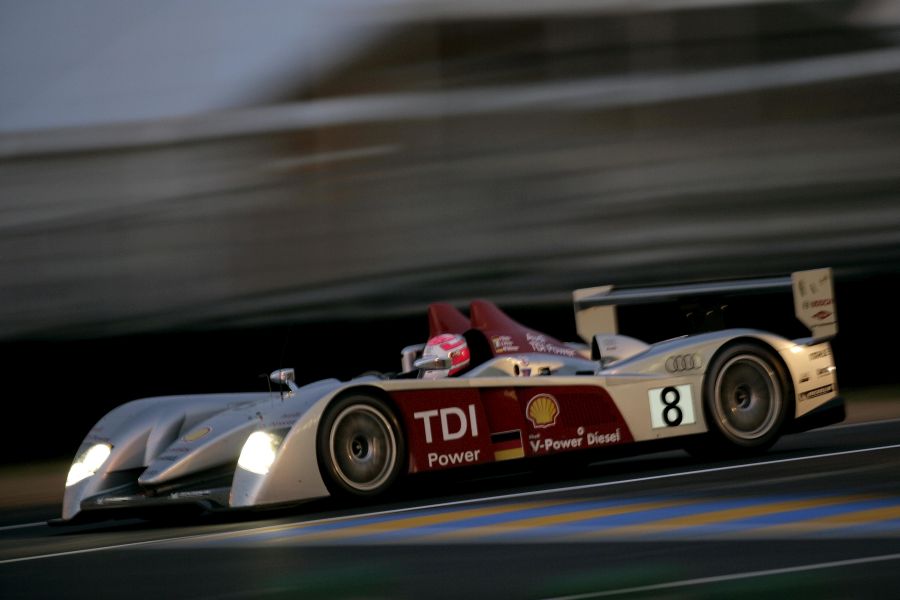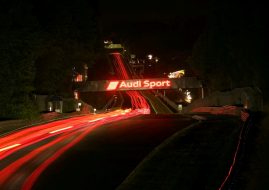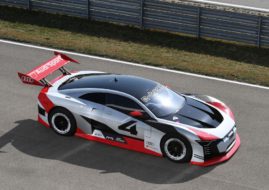Audi R10 TDI - First Ever Diesel-powered Winner of 24h Le Mans
Audi R10 TDI is a Le Mans Prototype racing car used by Audi factory team and Kolles team in sports car races from 2006 to 2010. The car marked motorsport history as the first ever diesel-powered car to win at 24 hours of Le Mans in 2006.
In total, Audi R10 TDI scored three overall Le Mans wins before it was replaced by R15 TDI in 2009. R10 TDI was also the championship-winning car for three consecutive years (2006-2008) in the American Le Mans Series, including two wins at Sebring 12 hours (2006, 2007).
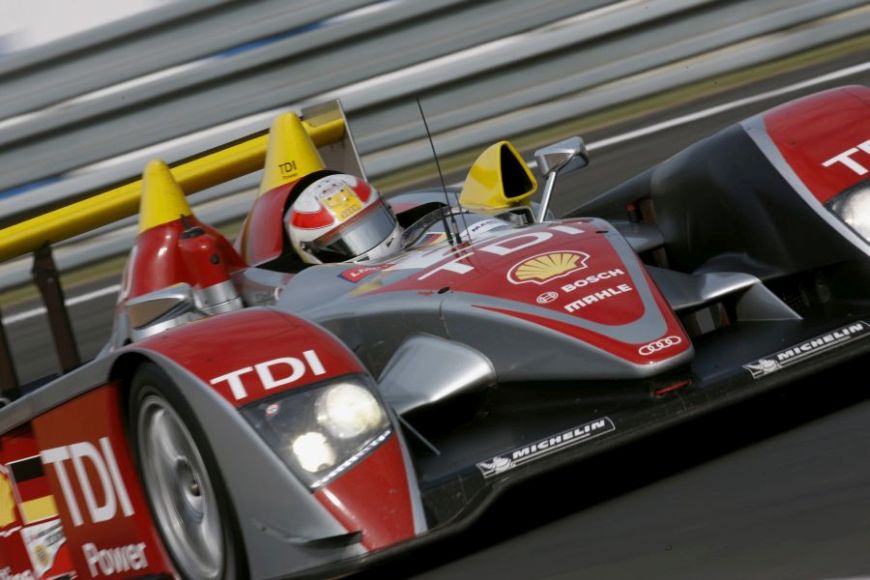
Audi R10 TDI open-top prototype was the successor of R8
Return to sports car racing with diesel-powered car
Audi was out of sports car racing and Le Mans as a factory team after 2002, following their third win with Audi R8 prototype. In 2004 and 2005, private teams won at Le Mans with the Audi R8, while the German manufacturer was developing a new car for Le Mans return in 2006.
And that car was a complete surprise because R10 TDI was using a diesel engine, unlike any other actual car. There were only three diesel-powered cars in Le Mans history before.
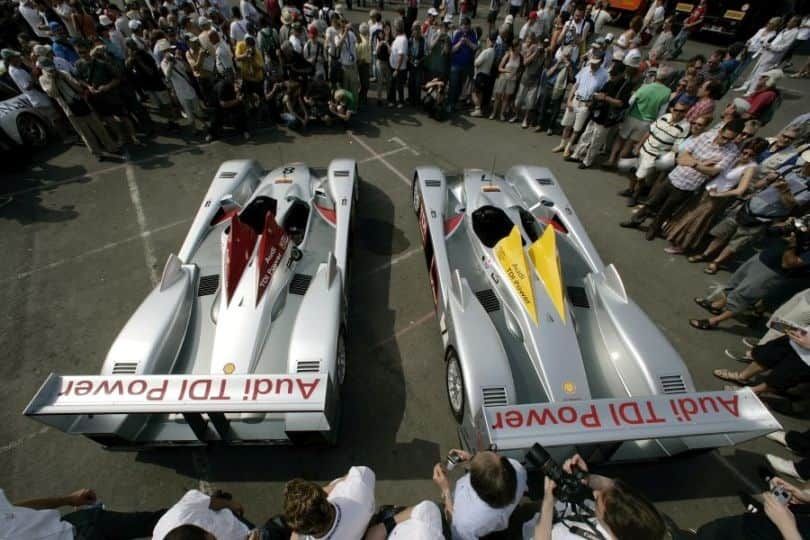
Diesel power became popular in 2006
R10 TDI was the fourth diesel car in Le Mans history
A long time ago, Delettrez brothers entered 1949 Le Mans race with their own car using a 4.4L 6-cylinder diesel engine from an American Army GMC truck.
They had one more attempt in 1950, joined by another diesel car on the grid, produced by MAP (Manufactures d’Armes de Paris). For decades after that, there were no diesel cars at Le Mans, until 2004, when Taurus Sports Racing fielded Lola B2K/10 with Caterpillar re-badged V10 TDI engine.
Compared to the previous diesel attempts, Audi was the first big manufacturer which tried to run at Le Mans with a diesel-powered car. That means, the company had serious plans for its car and the big money was spent for development of R10 TDI.
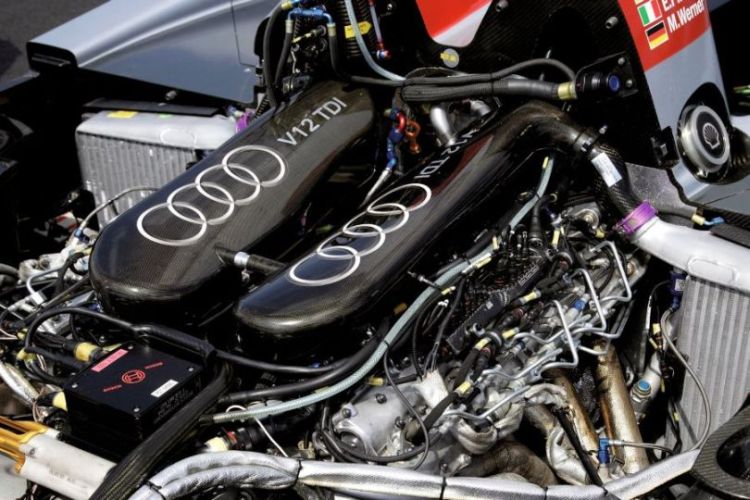
5.5-litre V12 TDI engine
Audi chose 5.5-litre V12 TDI engine
The engine of a choice was the 5.5-litre V12 TDI engine. It has two parallel turbochargers and utilizes the Turbocharged Direct Injection (TDI) technology. The engine block was made of aluminum, employing common rail direct fuel injection technology.
The turbochargers are supplied by Garrett, with 39.9 mm restrictor plates mounted. Audi’s V12 was officially producing about 650 hp, up to 700 hp in qualifying-mode. There was also a possibility of short-term overboost, with additional 150 hp for overtaking.
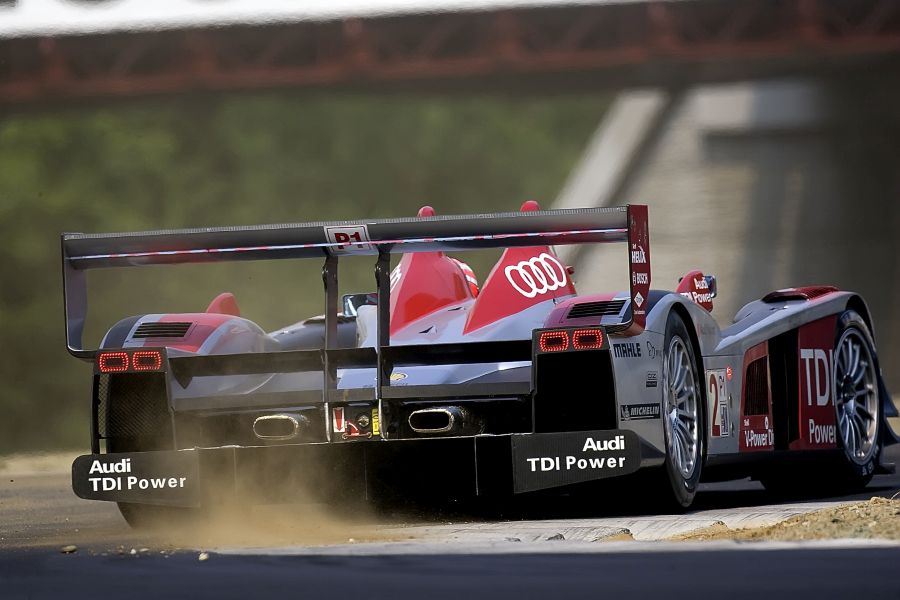
Audi R10 was the first of several Audi diesel-powered LMP1 prototypes
Similar to R8 but longer and heavier
Audi engineers had to solve a possible problem with the engine’s weight of more than 200 kilos, compared to 130 kg of a concurrent Judd V10. The wheelbase of a new car has been increased over the R8 to 2,980 mm to accommodate the longer engine. The open-cockpit R10 was similar to R8 but many design details and aerodynamics were different. The monocoque chassis was built 90% by Audi and 10% by Dallara as well with various suppliers manufacturing all the components and subassemblies. The cars are then assembled by Audi at Ingolstadt factory.
For the 2006 season, the homologation rules for Le Mans Prototypes (LMP) were changed, increasing the minimum weight for the LMP1 class from 900 kg to 925 kg.This was to allow closed-top prototypes to run with air-conditioning but also to allow Audi R10 to be competitive. The first Audi R10 TDI, which debuted at 2006 Sebring 12 Hours, was overweight at 935 kg.
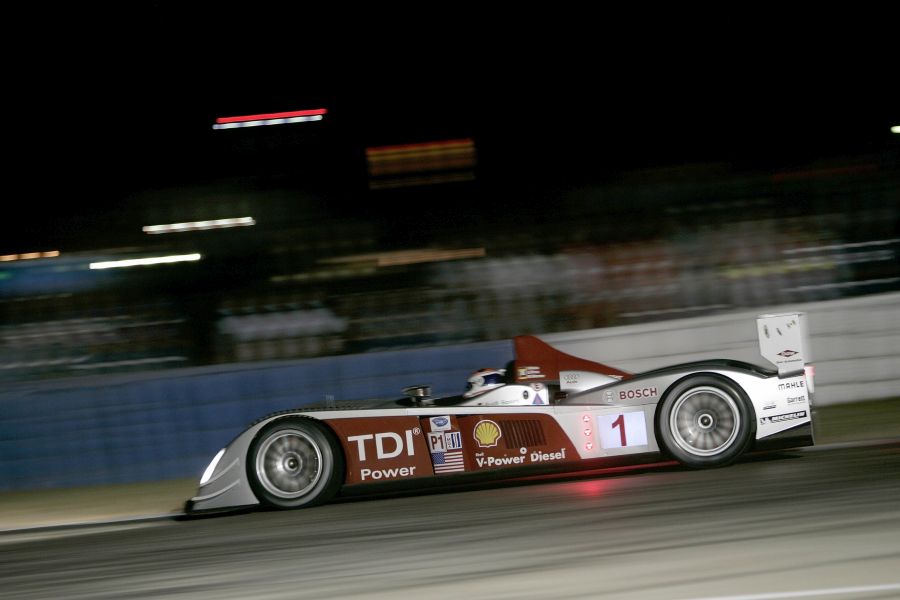
Audi R10 TDI at 2006 Sebring 12 hours
Maiden win for R10 TDI at 2006 Sebring 12 hours
The R10 scored its maiden victory in debut race, winning the 12 hours of Sebring in March 2006. The #2 Audi was driven by Tom Kristensen, Rinaldo Capello and Allan McNish.
The #1 car, driven by Frank Biela, Emanuele Pirro and Marco Werner, didn’t finish the race due to an overheating problem.
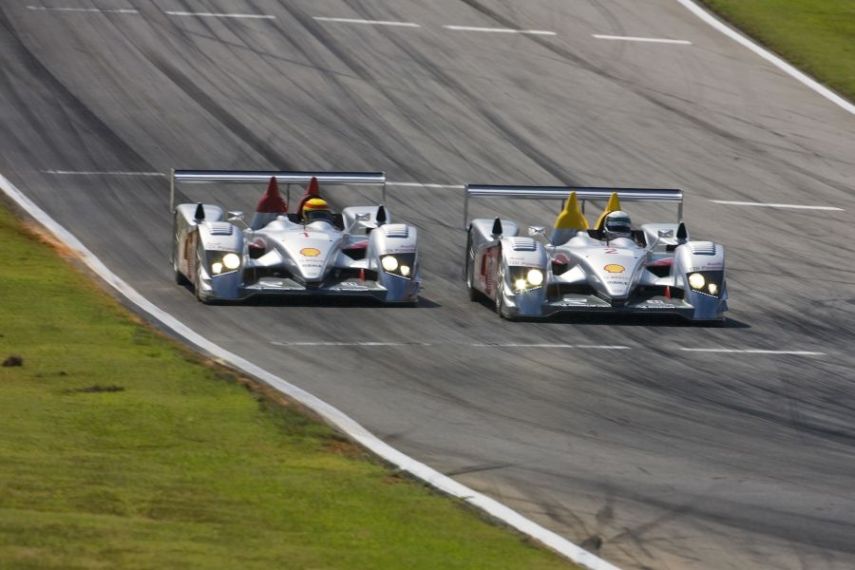
Audi R10 TDI was a dominant car in the 2006 ALMS season
Ten wins in ten races for the 2006 ALMS title
Sebring’s race was a part of the American Le Mans Series, in which Audi was combining R8 and R10 TDI until the end of the season, winning all ten races of the championship. Audi had no proper rivals in the LMP1 class (Lola B06/10-AER, MG-Lola EX257, Zytek 06S) and dominantly won 2006 ALMS titles both in teams’ and drivers’ standings.
Due to the sheer Audi dominance, the IMSA changed some rules during the season, increasing the minimum weight of petrol-powered LMP1s to 860 kg, but it didn’t prevent Audi from winning all races.
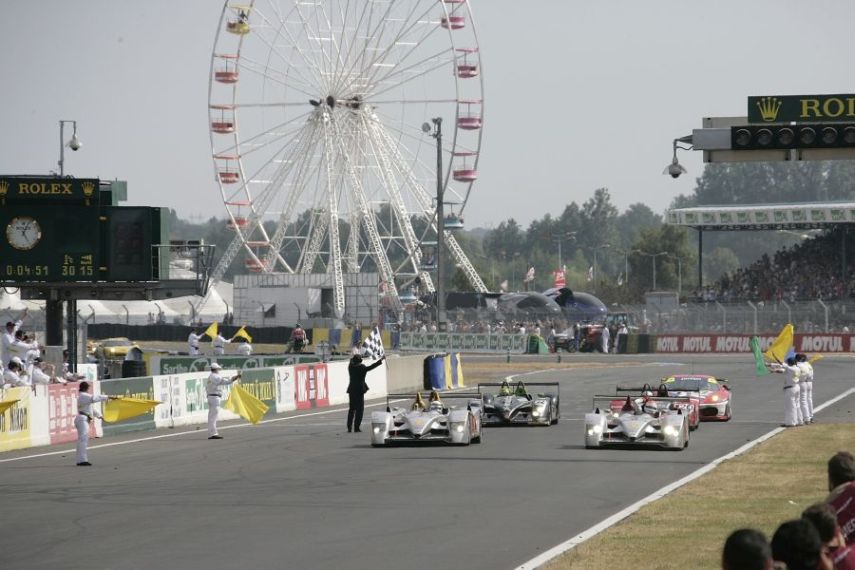
Historic victory at 2006 24h Le Mans for Audi R10 TDI
R10 TDI became the first ever diesel car to win Le Mans
On the other side of Atlantic, Audi R10 TDI debuted at 24 Hours of Le Mans in June 2006. The main rivals in the LMP1 class (Pescarolo C60-Judd, Courage LC70-Mugen, DomeS101-Judd) were at least two seconds slower per lap, so Audi easily took the win.
R10 TDI became the first ever diesel car to win at 24h Le Mans. The victorious car was the #8, driven by Frank Biela, Emanuele Pirro and Marco Werner. The #7 car suffered from reliability problems and finished in the third place, 13 laps behind the winning car. The drivers in the #7 were Tom Kristensen, Rinaldo Capello and Allan McNish.
2007 – one more LMP1 title in the ALMS
In the 2007 American Le Mans Series, Audi repeated a success by winning all twelve races in the LMP1 class. R10 TDI wasn’t the overall winner in all races, as Penske Racing’s Porsche RS Spyder Evo LMP2 car took the overall honors in eight races.
In the LMP1 class, Audi again had no proper rivals, taking teams’ title and drivers’ title for Rinaldo Capello and Allan Nish. They were LMP1 class winners in nine races but missed a victory at Sebring 12 hours. The winners in that race were Marco Werner, Emanuele Pirro and Frank Biela.

Audi R10 TDIs at 2007 Le Mans race
Beating Peugeot 908 HDi for 2007 Le Mans win
At 2007 24 hours of Le Mans, Audi successfully defended its 2006 victory. The car was challenged by new diesel-powered entry, the Peugeot 908 HDi FAP LMP1 prototype. Audi had three cars but two of them failed to finish.
The #3 car, driven by Lucas Luhr, Mike Rockenfeller and Alexandre Premat, crashed out after 23 laps. The #2 car, driven by Tom Kristensen, Rinaldo Capello and Allan McNish, suffered a wheel failure at approximately 300 km/h and collided with a barrier. At the end, Marco Werner, Emanuele Pirro and Frank Biela in the #1 car scored their second consecutive Le Mans win for the R10 TDI, beating the #8 Peugeot by ten laps.
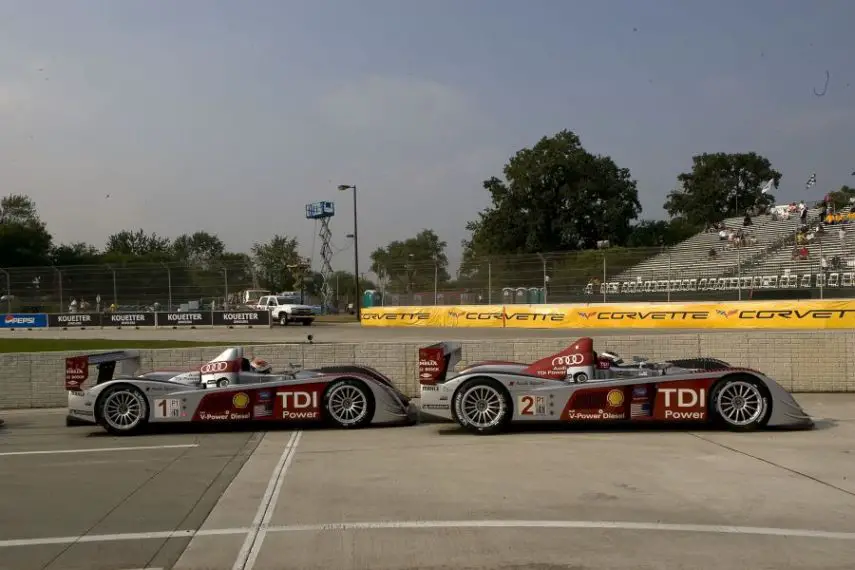
Audi R10 TDI in 2008
2008 – losing at Sebring, winning third ALMS title
In 2008, Audi entered the Le Mans Series for the first time, parallel to their American Le Mans Series commitments. In North America, Audi defended ALMS titles with ten LMP1 class wins and seven overall wins in eleven races.
The drivers’ champions were Lucas Luhr and Marco Werner. At Sebring 12 hours, Penske Racing’s Porsche managed to end Audi’s streak of seven straight victories.
Close battle for Le Mans Series championship title
In the Le Mans Series, Audi had much stronger competition. Two different Peugeot 908 HDi prototypes won four races, leaving Audi to win only the season-closing race at Silverstone.
After five races, Mike Rockenfeller and Alexandre Premat were the most consistent pair in the #2 Audi. Without wins, but with four podiums, they won the 2008 Le Mans Series title with just three points more than Peugeot’s #7 crew.
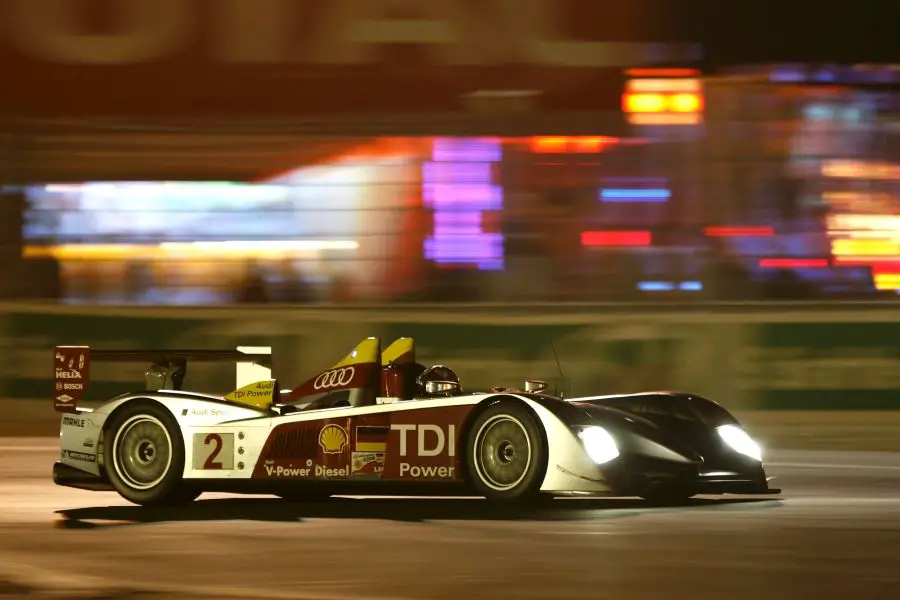
The #2 Audi R10 TDI won the 2008 24h Le Mans
Third Le Mans win against faster Peugeot
The highlight of the season was the 24h Le Mans race, which wasn’t a part of any championship. Peugeot had much faster cars both in qualifying and during the race, but thanks to better strategy Audi managed to score a third consecutive win with R10 TDI.
The winners were Allan McNish, Rinaldo Capello and Tom Kristensen in the #2 Audi, taking the checkered flag on lap 381 ahead of the #7 Peugeot, with a margin of just over four minutes. The other two Audi entries finished fourth and sixth overall.
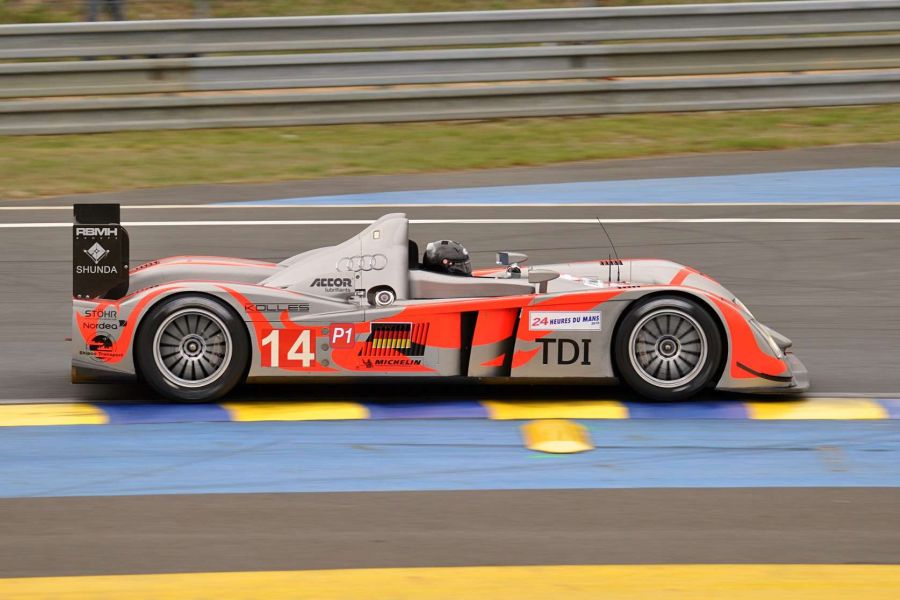
Team Kolles entered two Le Mans races with Audi R10 TDI
Kolles was running R10 TDIs for two more seasons
For the 2009 season, Audi replaced R10 TDI by the R15 TDI with a smaller, lighter, more-efficient V10 TDI engine. Colin Kolles made an agreement with Audi to run the R10 TDIs with factory assistance at Le Mans 24h and in the Le Mans Series.
The team fielded two cars at 24h Le Mans. The #14, driven by Andre Lotterer, Narain Karthikeyan and Charles Zwolsman Jr, finished in the 7th place. Another car (#15) was two places behind, driven by Giorgio Mondini, Christijan Albers and Christian Bakkerud. In the Le Mans Series, the #14 crew finished 7th in the final standings of the LMP1 class.
In 2010, Kolles didn’t enter Le Mans Series, participating only at the Le Mans 24 Hours. Both cars failed to finish and it was the end of a story about Audi R10 TDI.
Audi R10 TDI specifications
| Chassis | carbon fibre monocoque with fully stressed engine |
| Lenght | 4,650 mm |
| Width | 2,000 mm |
| Height | 1,030 mm |
| Weight | 925 kg |
| Engine | 5.5L V12 TDI (twin turbo diesel), mid longitudinally mounted |
| Power/torque | 650 hp/ 1,285 Nm |
| Gearbox | Xtrac 5-speed sequential |
| Transmission | rear wheel drive |
| Suspension (f/r) | double wishbones, coil springs over dampers, anti-roll bar |
| Brakes | ventilated carbon fibre discs, all-round |
Photos: audi-mediacenter.com,


